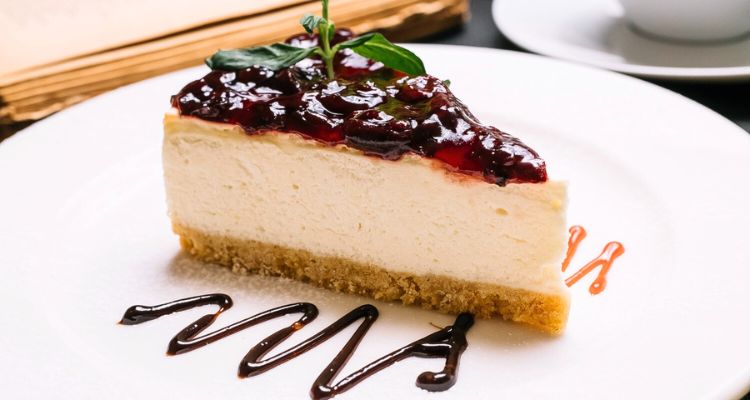Pregnancy is a magical journey full of excitement and joy, but it also comes with a slew of questions and concerns. Pregnant women should pay special attention to the foods they eat, for the sake of their own health and the health of their developing baby. Pregnancy is famous for food cravings, and craving cheesecake during pregnancy is quite common.
So a common doubt arises: “How safe is eating cheesecake during pregnancy?” Join us as we explore the world of cheesecake and uncover the guidelines that allow you to relish this creamy delicacy without compromising your pregnancy wellness. Read on to learn some important facts about cheesecake during pregnancy.
Is It Safe To Eat Cheesecake During Pregnancy
Pregnant women often crave cheesecake and are usually delighted to discover that it is a food they can typically consume without any issues. Cheesecake consumption during pregnancy is generally considered safe.
However, certain rules must be followed.
During pregnancy, it is safe to consume fully baked and fresh cheesecakes. From a nutritional standpoint, it is not advisable to consume cheesecake regularly, and it should be considered a special indulgence.
Dairy products that have not been pasteurized or that have been allowed to soft-ripen may harbor Listeria bacteria. This has the potential to result in an infection known as listeriosis.
Listeriosis is a risk factor for both miscarriage and stillbirth1. So exercise caution when eating cheesecake during pregnancy’s first trimester.
Salmonella bacteria can contaminate various types of food, such as eggs, meat, and vegetables. If left untreated, salmonella infections can lead to miscarriages. Improper handling or storage of food items like cheesecakes can allow salmonella bacteria to thrive.
Calculate Due Date With LMP
Related Reading: 9 Types Of Cheeses To Avoid During Pregnancy
Wondering if you can eat cheesecake from a restaurant when pregnant? Yes, you can have cheesecake, as long as it is fresh and has been stored properly. Please ensure to confirm with the chef that the cheesecake has been made using pasteurized ingredients. It is important to exercise caution when consuming toppings or fillings that may contain raw eggs or are unpasteurized.
However, we cannot ignore the potential risks associated with consuming cheesecake during pregnancy:
- Unpasteurized dairy components included in certain cheesecakes may be dangerous to an expecting mother and her unborn child.
- The E. coli germs in the unpasteurized cheese might make you sick to your stomach. Anaemia may develop if this illness isn’t addressed in time during pregnancy.
- Unbaked cheesecakes may contain raw eggs, which should be avoided by pregnant women.
- Calories abound in cheesecakes. Unwanted pregnancy weight gain from overindulging in cheesecakes is a real possibility.

Benefits Of Eating Cheesecake During Pregnancy
Although cheesecake is delicious, there are no health advantages of eating it while pregnant. It should be consumed in moderation as part of a healthy diet. Eggs, sugar, cheese, and cream are some of the ingredients of cheesecake. These are the elements that give cheesecake its nutritional worth.
Related Reading: How To Cope With Sweet Cravings During Pregnancy
There is no standard cheesecake serving size; however, a 100-gram slice has the following nutrients that are helpful for pregnant women2:
- 350 calories
- 26 grams of total carbohydrates
- 23 grams of fat
- 31 mg of Calcium
- 90 mg of potassium
- 5.5 grams of protein
- 0.5 mcg of Vitamin D
- 159 mcg of Vitamin A
- 20 mcg of folate
Thus, it comes with some benefits as well. Following are some of the benefits of cheesecake during pregnancy:
- May promote ideal weight gain: Cheesecakes contain both saturated and unsaturated fats in them. These are vital for the ideal weight gain of the baby present inside the womb.
- Carry the goodness of calcium: Cheesecakes often contain dairy products like cream cheese, which are rich in calcium. Calcium is essential for the development of the baby’s bones and teeth, as well as for maintaining the mother’s bone health.
- Reduces blood pressure: High blood pressure is a common issue during pregnancy. Cheesecake contains potassium, which is a mineral that aids in balancing the sodium levels in the body and may assist in reducing blood pressure. One serving of traditional cheesecake typically contains approximately 159 milligrams of potassium3. Consuming cheesecake can aid in regulating your blood pressure.
- The right amount of protein: Cheesecakes contain proteins that are essential for the development of the baby present inside. Protein is vital for the formation of muscles and tissues in the baby.
- Helps to maintain healthy bones: Cheesecake has a higher nutritional value than regular cake because of the mineral phosphorus it contains. One serving of cheesecake contains around 164 mg of phosphorous4. Phosphorus aids in the body’s absorption of calcium and promotes healthy bone development. In addition, the vitamin A in it is beneficial to bone health. This dish is tasty and can be part of a well-balanced diet that helps keep bones healthy.
Eating cheesecake while pregnant can be good for you because of all the nutrients in the ingredients. Cheesecake is delicious, but it is important to eat it in moderation as part of a healthy diet that includes a wide range of foods rich in nutrients.
Related Reading: Top 10 Calcium Rich Foods For Pregnancy
What Cheesecake To Avoid When Pregnant?
It is imperative to exercise caution with regard to the selection of cheesecake varieties during pregnancy in order to ensure the safety and well-being of both the mother and the developing fetus.
Some types of products could present hazards because of the possibility of contamination or the inclusion of components that might have adverse effects on pregnancy.
The following varieties of cheesecake are not recommended for consumption during pregnancy:
- Cheesecakes made with raw eggs: Certain cheesecake recipes incorporate uncooked eggs in the filling, thereby elevating the likelihood of Salmonella contamination. Consuming raw eggs can potentially result in foodborne illnesses due to the presence of harmful bacteria, resulting in various complications such as nausea, vomiting, and diarrhea.
- Cheesecakes made with unpasteurized cheese: Soft cheeses produced from raw milk, including but not limited to Brie, Camembert, feta, queso blanco, and blue cheese, have the potential to harbor Listeria monocytogenes, a pathogenic bacterium that is responsible for listeriosis.
- Cheesecakes that have been preserved in the refrigerator for days: The shelf life of refrigerated cheesecakes may vary between 3 to 5 days, depending on the particular recipe and ingredients used. Beyond this point, there may be a decline in the quality and safety of the cheesecake. Consuming refrigerated cheesecakes that have been stored for an extended period of time may potentially jeopardize the healthy progression of pregnancy, given that pregnant women are generally more vulnerable to food-borne illnesses. Therefore, it is recommended to consume cheesecake that has been refrigerated within a limited period of time.
- Cheesecakes with excessive additives or artificial sweeteners: Some commercial cheesecakes may include excessive additives, artificial sweeteners, or sugar replacements in high concentrations. While these compounds are usually regarded as safe in moderation, they should be avoided during pregnancy. Choose handmade or reputed ones with natural components and little additives.
- Cheesecakes with alcoholic ingredients: Some recipes may call for alcoholic ingredients like rum, liqueurs, or brandy. Alcohol consumption during pregnancy can lead to fetal alcohol spectrum disorders (FASDs) and other developmental issues4. Avoid cheesecakes that contain alcoholic ingredients or opt for non-alcoholic versions.
- Cheesecakes with raw crusts: Crusts of uncooked cookie dough or other uncooked ingredients are used in several cheesecake recipes. Bacteria like Salmonella and E. coli may thrive in raw dough.

Safe Cheesecakes For Pregnancy
Several factors should be taken into account while selecting a cheesecake that is suitable for consumption during pregnancy. Cheesecakes that are both tasty and safe for you and your baby to eat are possible with careful ingredient selection and adherence to safe food handling procedures.
Related Reading: Is It Safe To Eat Jelly During Pregnancy?
Here are some risk-free choices:
- Baked cheesecakes: Opt for cheesecakes that are baked rather than those made with raw or undercooked ingredients. Baking helps kill any potentially harmful bacteria, making them a safer option. Baked cheesecakes are often made with pasteurized ingredients, including pasteurized cream cheese and eggs.
- Cheesecakes made with pasteurized ingredients: Ensure that the cheesecake is prepared using pasteurized cream cheese, eggs, and any other dairy products. Pasteurization is a process that kills harmful bacteria, making these ingredients safer for consumption during pregnancy.
- Vegan cheesecake: Vegan cheesecake is a dessert that replicates the taste and texture of traditional cheesecake without using any animal-based ingredients. In vegan cheesecakes, soaked cashews and coconut milk are used instead of dairy. Some of them are made with soft tofu or with vegan cream cheese substitutes. Vegan cheesecake recipes often incorporate various flavors to enhance the taste. Popular options include vanilla extract, chocolate, and fruit purees such as strawberry or raspberry.
- Homemade cheesecakes: Cooking your own cheesecake gives you complete control over the ingredients and procedure. You can be certain that the ingredients are fresh, pasteurized, and correctly handled.
- Cheesecakes from reputable brands: If you choose to purchase cheesecakes, opt for those from reputable bakeries or brands that prioritize food safety. Read the labels and look for indications that the ingredients used are pasteurized.
- Cheesecakes without risky toppings: Cheesecakes topped with raw or undercooked eggs, unpasteurized cheese, or fish and shellfish rich in mercury should be avoided. Top it with something more benign, such as fresh fruit, chocolate, or whipped cream.
Conclusion
Pregnancy can come with cravings, and indulging in a slice of cheesecake can provide psychological satisfaction and help curb cravings. Enjoying occasional treats can contribute to positive overall well-being during pregnancy. If you take the proper safety measures, eating cheesecake while pregnant is completely safe and delicious.
Portion control, calorie counting, and maintaining a healthy dietary balance are all important for avoiding weight gain and its associated health risks. A healthcare expert should be consulted for individualized advice and direction about pregnant eating.

